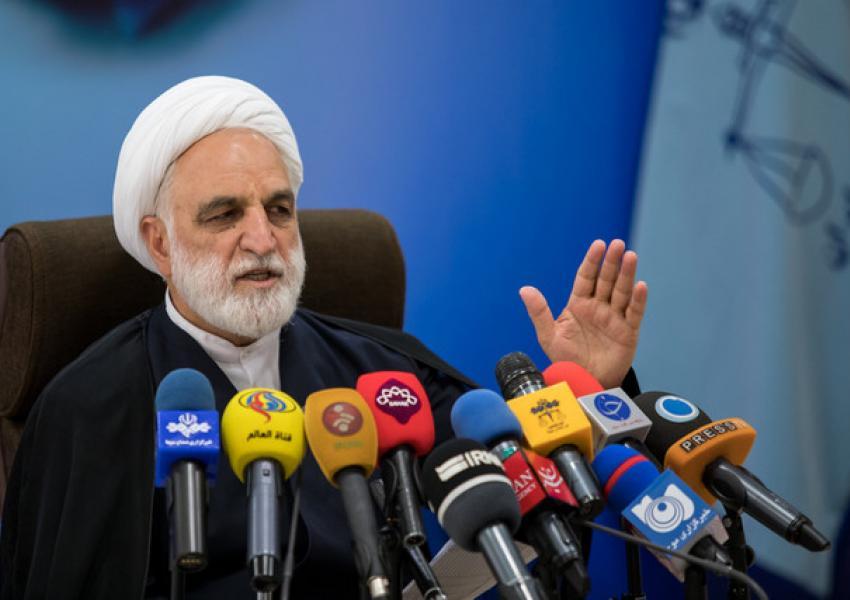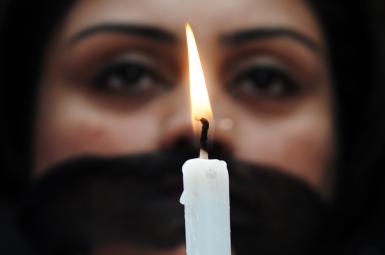
Meet Iran’s New Chief Justice
On Thursday, Iran’s Supreme Leader Ayatollah Ali Khamenei appointed Gholam-Hossein Mohseni Ejei as the next chief justice, following Ebrahim Raisi’s victory in the Iranian presidential election. The chief justiceship matters not only because of its control over a repressive state organ that is responsible for the silencing of dissidents and the detention of foreign nationals, but also for its broader power within the Iranian establishment. The head of the judiciary has a seat on the Supreme National Security Council (SNSC) and the Supreme Economic Coordination Council. He also nominates jurists who serve on the Guardian Council. Thus, the post wields considerable influence in Tehran.
Each chief justice who has served under Khamenei—Mohammad Yazdi, Mahmoud Hashemi Shahroudi, Sadegh Larijani, and Ebrahim Raisi—have also been considered by some observers as potential contenders to succeed him as supreme leader, should the need arise. Indeed, it is also possible Raisi and Mohseni-Ejei will serve as members of an interim leadership council upon Khamenei’s demise. But of all these clerics who have occupied the position, Raisi has been the most political, having run for president twice, including while serving simultaneously as chief justice in his last and successful campaign. No other chief justice has done so.
Who is Gholam-Hossein Mohseni Ejei?
Born in 1956 in Esfahan, Mohseni-Ejei received his clerical education at the Qom Seminary and holds a master’s degree in international law from Islamic Azad University. His career has spanned both the intelligence community and the judiciary, serving as representative of the judiciary in the Ministry of Intelligence, and prosecutor-general of the Special Court for Clergy in Tehran and then nationally. During the 1990s, he was implicated in the executions of dissidents. While at the Special Court for Clergy, Ejei made headlines, prosecuting the reformist Mayor of Tehran Gholam-Hossein Karbaschi, who was an important ally of President Mohammad Khatami. Ejei also infamously bit a journalist Issa Saharkhiz during a fight at a meeting of a press advisory council. As RFE/RL found in 2009, Mohseni-Ejei’s website went as far as to include the incident in his official biography at one point.
Following the election of Mahmoud Ahmadinejad to the presidency in 2005, Mohseni-Ejei served as his first minister of intelligence and lasted in the post until 2009, just after the disputed presidential election. The United States subsequently sanctioned him in 2010 under Executive Order 13553, citing his tenure in the Ministry of Intelligence. The U.S. Treasury Department wrote, “Mohseni-Ejei confirmed that he authorized confrontations with protesters and their arrests…As a result, protesters were detained without formal charges brought against them and during this detention detainees were subjected to beatings, solitary confinement, and a denial of due process rights at the hands of intelligence officers under the direction of Mohseni-Ejei.” The European Union sanctioned him in 2011 as well, using a similar rationale.
Despite Mohseni-Ejei’s role as a loyal enforcer for the system which ensured the victory of Ahmadinejad, he was quickly dismissed following the disputed election. Mehr News Agency quoted an informed source as saying Mohseni-Ejei was fired “following a verbal quarrel between the intelligence minister and the president in Wednesday’s cabinet meeting over the appointment of” Esfandiar Rahim Mashaei as first vice president. Mashaei and Ahmadinejad—especially in his second term—were widely perceived as questioning the role of clerics in the Islamic Republic. Mohseni-Ejei embodied the core of the clerical establishment, thus his early distancing from Ahmadinejad was a prelude to the eventual ostracization of Ahmadinejad and his orbit.
After his rupture with Ahmadinejad, Khamenei still managed to find a landing spot for Mohseni-Ejei. He was named attorney general in 2009 and lasted in the post until 2014. After, Mohseni-Ejei was named first deputy chief justice, switching roles with Raisi, who went from first deputy chief justice to attorney general in 2014. Raisi and Mohseni-Ejei also have a shared experience as prosecutors-general of the Special Court for Clergy and as students at the Haghani School.
Mohseni-Ejei’s feud with Ahmadinejad continued through these years as well. In 2017, they became embroiled in a war of words, with Mohseni-Ejei accusing Ahmadinejad, the president he served under, as “mentally ill.” That prompted a riposte from Ahmadinejad’s former vice president for executive affairs, who likened Mohseni-Ejei to former Chief Commander of the SS in Nazi Germany Heinrich Himmler.
When Raisi became chief justice in 2019, Mohseni-Ejei, despite being named to the post under Raisi’s predecessor Sadegh Larijani, continued as Raisi’s first deputy chief justice. Through the years, reports have emerged of tension between the two men as Raisi was never able to name his own deputy.
What are the implications of Mohseni-Ejei’s appointment?
Mohseni-Ejei will parachute into the inner sanctum of national security decision-making as a member of the SNSC. Indeed, the dynamic will change as Raisi is the first president to have presided over the judiciary prior to being president. Whether he is able to exert more control over the debate in the SNSC given this experience remains an open question. Mohseni-Ejei’s long personal relationship with Raisi will be tested here, especially if he harbors future ambitions. Indeed, this is not the first time Mohseni-Ejei has served on the SNSC—he previously had a seat at the table as intelligence minister. But the new chief justice occupies a platform that positions him differently in this second tour on the SNSC. Before, he was serving as a presidential appointee—albeit with Khamenei’s blessing. However, now, Mohseni-Ejei’s power stems from his direct appointment by the supreme leader to his post, thus increasing his influence. Raisi and Mohseni-Ejei will also be well-positioned to crack-down on any unrest in the years to come.
Likewise, in addition to Iran’s supreme leader, now the heads of two of three branches of the Iranian government will be led by sanctioned individuals. This will complicate and increase the domestic political costs of engagement with Tehran in Western capitals.




